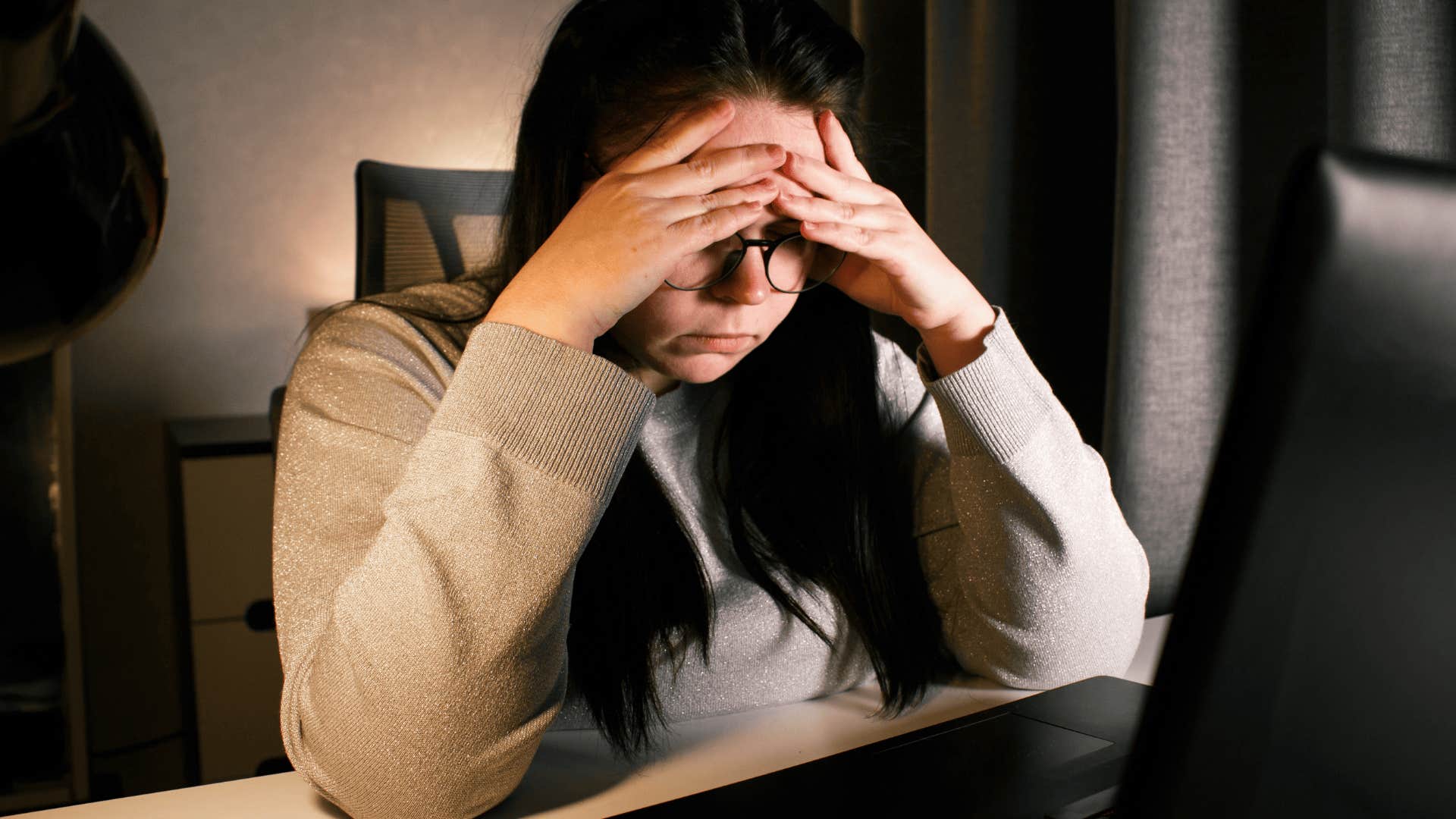People Who Feel Deeply Emotional All The Time Usually Have These 11 Reasons
It can be frustrating to feel so much more than everyone else.
 gpointstudio | Shutterstock
gpointstudio | Shutterstock Being a highly emotional person does not necessarily mean you're sad all the time. It also doesn’t mean that you’re "crazy" or exaggerate everything. It just means you feel things more intensely than most people. You might cry easily, get overwhelmed quicker, or react strongly to situations others brush off. But that’s not a flaw — it's part of how you're wired.
People who feel things deeply provide understanding and logic behind what others may perceive as "abnormal" or simply something they don’t understand. However, it's important to note that there's really no baseline for emotional response. So while one person might perceive your demeanor as being "too" emotional, another person might not even register your emotional behavior.
People who feel deeply emotional all the time usually have these 11 reasons:
1. It runs in your family genetics
 Rawpixel.com
Rawpixel.com
If your parents or close relatives are deeply emotional, you probably are too — genetics can make you more prone to intense feelings. Studies have shown that people have a genetic disposition to certain emotions. So if you've noticed a family member, like your mom or dad, has heightened emotions, you've them to thank for your feelings.
2. You're not getting enough sleep
 Gladskikh Tatiana
Gladskikh Tatiana
When you're sleep-deprived, your brain has a harder time managing emotions, making everything feel way more overwhelming. A 2010 study found that a lack of sleep makes you more susceptible to feeling negative emotions.
3. You struggle with anxiety
 Gorodenkoff | Shutterstock
Gorodenkoff | Shutterstock
Anxiety makes it tough to regulate emotions, so small things might trigger big reactions, even if you know they shouldn’t. Research out of Stanford University suggests that those with anxiety disorders have difficulty regulating their responses to negative emotions and may not be able to manage stress effectively.
This means that you might have a strong emotional response to something that doesn't necessarily warrant one.
4. You've used (or abused) substances to cope
 Gorgev | Shutterstock
Gorgev | Shutterstock
Using or abusing substances can mess with the way you handle the way you feel (and how you deal with those feelings), and over time, they can make them even more complicated to control. Emotional regulation and substance abuse go hand-in-hand and create a nasty cycle.
A 2014 study found that not only can the inability to regulate emotions properly lead to substance abuse, but long-term substance abuse can also lead to emotional dysregulation.
5. You might have a personality disorder
 Andrey Yurlov | Shutterstock
Andrey Yurlov | Shutterstock
Some personality disorders, such as Borderline Personality Disorder, create difficulties with proper emotional regulation. Conditions like these can make it harder to process emotions in a balanced way, which can lead to intense feelings and a rollercoaster of emotional ups and downs.
6. You're a highly sensitive person
 JG Fotografia | Shutterstock
JG Fotografia | Shutterstock
Some people are wired to feel everything more deeply — it's not a weakness, it's part of being highly sensitive. Highly sensitive people (commonly known as HSPs) process emotions differently than those who are not, and often feel things more intensely and are known to "wear their heart on their sleeve".
7. Your diet could be messing with your mood
 Oksana Lomnova | Shutterstock
Oksana Lomnova | Shutterstock
Everything you eat affects your body, both good and bad. If you're feeling overly emotional, it could be due to your diet. Eating a lot of processed carbs or sugar can cause blood sugar crashes that make you feel more emotional, anxious, or down.
In fact, it's suggested that eating a diet that is high on the glycemic index can increase depressive symptoms. An example would be carbohydrates.
8. You're not moving your body enough
 New Africa | Shutterstock
New Africa | Shutterstock
Physical exercise offers many health benefits and can help regulate moods by balancing hormones. However, avoiding regular activity and movement can make you feel more emotional, with feelings becoming heavier and more difficult to manage.
Two studies have shown that daily exercise helps regulate emotions better than not exercising: One in 2018, which found that more frequent aerobic exercise is linked to fewer or less severe symptoms of depression, anxiety, and general stress. A 2017 study also found that people who struggle to manage their emotions tend to feel worse for longer after something upsetting — unless they’ve done some aerobic exercise beforehand. This suggests that even a single workout can make it easier for your brain to handle tough feelings, especially if emotional regulation is challenging for you.
9. You're dealing with a lot of stress
 Gladskikh Tatiana | Shutterstock
Gladskikh Tatiana | Shutterstock
Chronic stress can have a significant impact on both your body and mind, often making someone very emotional and feeling overwhelmed by their inner feelings. It wears you down emotionally, making you more likely to cry, snap, or feel overwhelmed by even small stuff.
A study from 2018 showed that increased stress levels increase negative emotions such as anger and depression.
10. Your hormones are all over the place
 LightField Studios | Shutterstock
LightField Studios | Shutterstock
Hormonal shifts — from PMS, pregnancy, or even stress — can make your emotions feel totally out of control. Anyone who has ever experienced PMS or has been pregnant knows that hormones can make your emotions run wild.
Having an imbalance of hormones causes a person to feel all kinds of emotions. Women (and men!) can have fluctuations in their cortisol levels, which cause stress and sleep deprivation.
11. You're burned out
 Krievietka | Shutterstock
Krievietka | Shutterstock
When you're exhausted, everything seems more difficult, especially managing your emotions. Burnout can leave you feeling vulnerable and overly sensitive. It can cause you to become emotional because of fatigue and loss of motivation. This overwhelm can impair your ability to regulate emotions, leading to the expression of any feelings you have.
Brittney Lindstrom is a Licensed Professional Counselor and Certified Rehabilitation Counselor.

